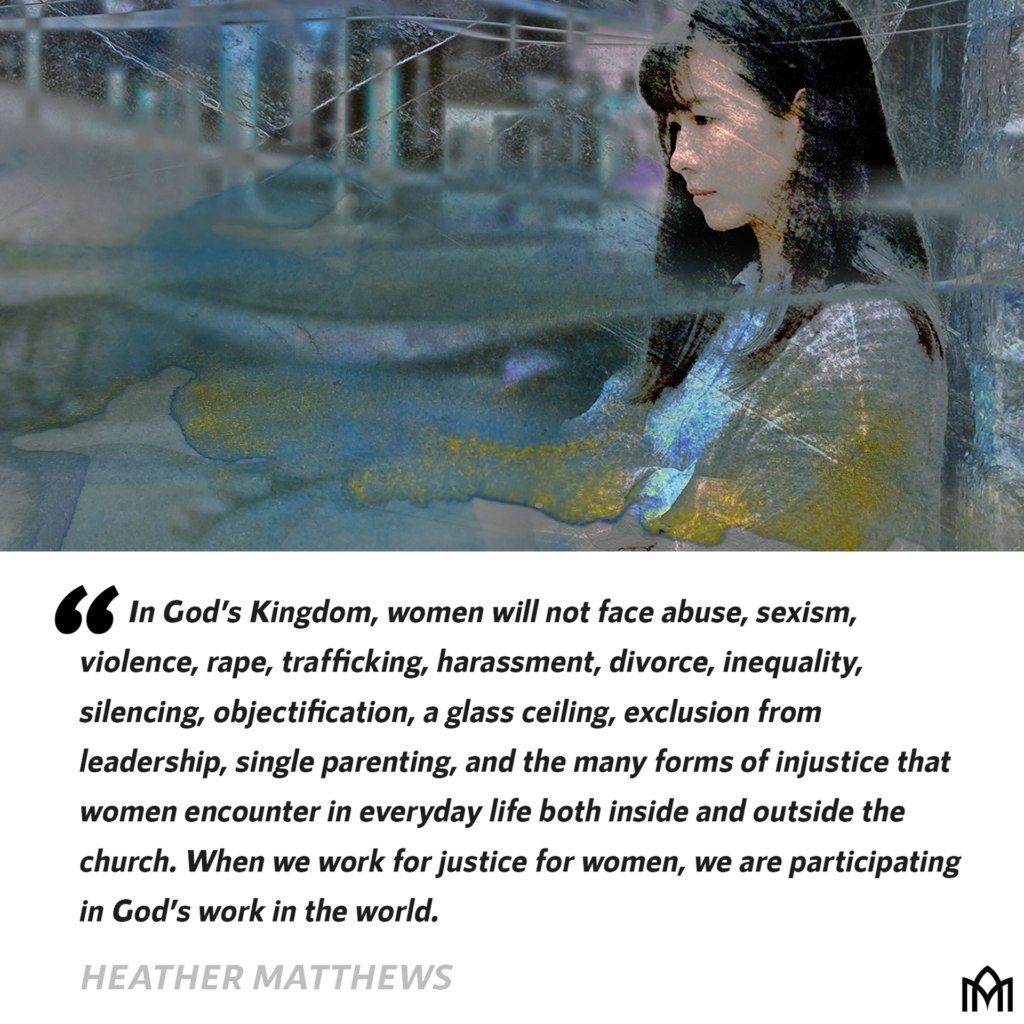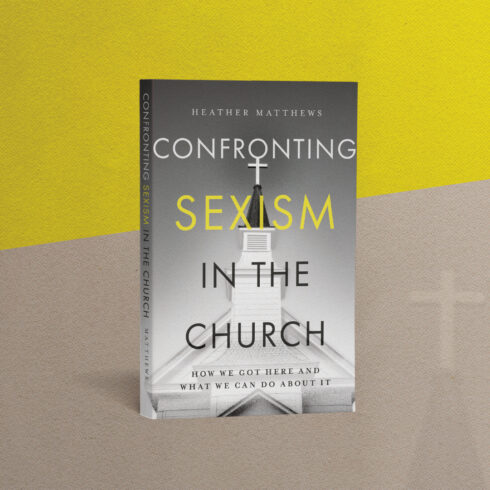Biblical Justice Includes Justice for Women
Confronting Sexism in the Church, Pt. 2 of 3
*Editorial Note: Confronting Sexism in the Church: How We Got Here and What We Can Do About It, written by Heather Matthews, is a new release in the ongoing Missio Alliance & IVP Book Series. We remain expectant in the prophetic work of justice Heather is undertaking. Please purchase a copy! ~CK
Justice is Central to God’s Work in Our World
Psalm 50: 6 declares, “The heavens proclaim his righteousness, for he is a God of justice.” My understanding of this verse and God’s heart for justice grew over time through a series of experiences as I served in several ministry contexts throughout my adulthood. As a young adult, I spent a few years serving at a church in Nairobi, Kenya. Although the church was predominately college-educated Kenyans, it was located in the heart of the capital city, Nairobi, where there were pockets of prosperity and extreme poverty throughout. In Nairobi, it was impossible to follow Jesus without concern for the injustice and oppression that was all around. As a result, the church planted new churches in informal settlements and started organizations to provide healthcare, support for people with HIV/AIDS, orphans, and other vulnerable populations. This was the beginning of my enlightenment and the transformation of my understanding of the gospel.
Back in the United States, another church where I serve worked in nearby prisons and with prisoner re-entry programs, with recent immigrants and refugees offering legal services, language learning, and practical resources, and in other under-resourced neighborhoods and schools providing tutoring, job training, and counseling services. When I planted a church, I intentionally worked to grow a body of believers that engaged in our local community and attempted to bring love and justice to our city in multiple ways. Besides my work in these settings, I’ve had my own personal experience of injustice. I’ve experienced sexism in the church and abuse in my family. As I was immersed in each of these settings, I came to understand God’s hatred of injustice and his compassion for the vulnerable in new ways.
We are reminded throughout Scripture, both in the Old and New Testaments, that justice is central to our identity with God and our work in the world.
Micah 6:8 says:
“He has shown you, O mortal, what is good. And what does the Lord require of you? To act justly and to love mercy and to walk humbly with your God. “
In Isaiah 1:17, we similarly read,
“Learn to do right; seek justice. Defend the oppressed. Take up the cause of the fatherless; plead the case of the widow.”
The Imprecatory Psalms call out for justice for the oppressed and show God’s hatred of the wicked oppressor. For example, in Psalm 10:1-2, the Psalmist cries out to God about injustice. He says,
“Why, Lord, do you stand far off? Why do you hide yourself in times of trouble? In his arrogance the wicked man hunts down the weak, who are caught in the schemes he devises.”
But later, in verses 17-18, the Psalmist is reminded:
“You, Lord, hear the desire of the afflicted; you encourage them, and you listen to their cry, defending the fatherless and the oppressed, so that mere earthly mortals will never again strike terror.”
Justice is about what is right, fair, moral, and good. Justice leads to harmony and peace, is closely connected to righteousness, and aligns with God’s character throughout the Scriptures. God loves the whole world, but he shows particular preference for the poor, vulnerable, and oppressed. Justice is at the heart of the gospel.
We are reminded throughout Scripture, both in the Old and New Testaments, that justice is central to our identity with God and our work in the world. Share on X
The Kingdom of God Seeks Justice for the Marginalized
In fact, Jesus’ identity and the Kingdom of God are marked by justice for the vulnerable and oppressed. When Jesus announced his ministry in Luke 4:18-19, he interestingly read from the book of Isaiah, aligning his purpose with the work of justice and said,
“The Spirit of the Lord is on me, because he has anointed me to proclaim good news to the poor. He has sent me to proclaim freedom for the prisoners and recovery of sight for the blind, to set the oppressed free, to proclaim the year of the Lord’s favor” (Isaiah 61:1-2a).
When John was doubting Jesus’ identity as the Messiah, Jesus said, “Go back and report to John what you have seen and heard: The blind receive sight, the lame walk, those who have leprosy are cleansed, the deaf hear, the dead are raised, and the good news is proclaimed to the poor” (Luke 7:22). The Kingdom of God that Jesus inaugurates is one of justice and shalom for all. Jesus came to redeem and restore the world and to free people and all of creation from sin, brokenness, and injustice. As a result, we have the opportunity as God’s people to participate in the redemption of the world, bringing God’s Kingdom to earth by addressing issues of injustice. Though the work of justice will never be complete until Jesus reigns again, God has called us as his followers to bring light, hope, and freedom to places of darkness, oppression, and injustice.
Justice is about what is right, fair, moral, and good. Justice leads to harmony and peace, is closely connected to righteousness, and aligns with God’s character throughout the Scriptures. (1/2) Share on X
God loves the whole world, but he shows particular preference for the poor, vulnerable, and oppressed. Justice is at the heart of the gospel. (2/2) Share on X
Justice for Women is Kingdom Work
Chief among the people that God wants to free from injustice are women. Historically, women have been abused, marginalized, repressed, and harmed in countless ways since the fall in Genesis 3. Injustice is the misuse of power by the powerful over the powerless. Throughout history, women have suffered because of patriarchy both in the world and in the church. Men have misused their power over women. In a plethora of ways, women have been prevented from being fully human and fully alive.
Throughout Scripture, we see God working for justice for women. God is passionate about justice for vulnerable women, and promises punishment for those who take advantage of them, especially religious leaders. (Lk 18, 21). For example, the Bible has much to say about care of widows. Jesus told many stories and parables highlighting the faith of widows and promised punishment for those who harm widows (Mark 12:40). Jesus cared for women who were ostracized like the woman at the well (John 4). In Matthews 9, we see Jesus healing a young girl of twelve years old, the only daughter of Jarius, a tender story about the value of girls. In the same passage, he healed the woman who had been bleeding for twelve years, calling her daughter (Matthews 9:20). Jesus cared more about freeing women than following the religious rules of the day (Luke 13:10-17). Jesus often affirmed the value of women. When Jesus healed the crippled woman on the Sabbath in Luke 13, he called her “Daughter of Abraham” to indicate her immense worth and declared, “You are set free!” all while calling the religious leaders “hypocrites,” flipping the script about who was valued and exhibited the greatest faith. Though Jesus often healed physically, it also led to spiritual healing, relational healing, as well as economic justice for women.
Jesus believed that girls and women are important in the Kingdom of God. Jesus elevated and valued women in new ways that were not typical in the existing patriarchal society. Jesus came from a woman, Mary, whose faith and devotion are unparalleled in the New Testament. Jesus invited women to be his disciples, even though typically only men could be disciples in his day (Luke 10:39). He invited women into leadership, as he did with Mary Magdalene, Susanna, and Joanna. Jesus cared about how men treated women, and gave instructions to men about lust and divorce that protected them in society, putting responsibility back on men rather than blaming women (Matthew 5:27-32). He protected the woman who was going to be stoned. Jesus consistently elevated women and their voices. Martha was the first to identify Jesus as the Messiah, and women – Mary Magdalene, Joanna, Mary the mother of James, and the other women with them – were the first witnesses of the resurrection (Luke 24:10). In these ways and more, Jesus actively enacted justice for women.
Our heart and work for justice reflects God’s character and purposes, and it testifies to the reality of the Imago Dei within us. As we work for justice in the world, bringing God’s Kingdom to earth, this must include justice for women. Our faith and action must validate that women are made in the Image of God, are of equal value, created to live in equality and mutuality with men, and fully empowered to steward their gifts in the Church and world. Throughout Scripture, we see the arc of redemption moving towards freedom, equality, inclusion, and love for women. In the book of Acts, we see women and men together creating this new reality of the kingdom of God, where there is neither male nor female, but all are one in Christ Jesus (Galatians 5:28). This is the new creation that has begun now and is the precursor of the redemption and restoration of all creation, including women.
Jesus believed that girls and women are important in the Kingdom of God. Jesus elevated and valued women in new ways that were not typical in the existing patriarchal society. Jesus invited women to be his disciples. (1/2) Share on X
Jesus invited women into leadership. He cared about how men treated women. Jesus consistently elevated women and their voices. In these ways and more, Jesus actively enacted justice for women. (2/2) Share on X
In God’s Kingdom, women will not face abuse, sexism, violence, rape, trafficking, harassment, divorce, inequality, silencing, objectification, a glass ceiling, exclusion from leadership, single parenting, and the many forms of injustice that women encounter in everyday life both inside and outside the church. When we work for justice for women, we are participating in God’s work in the world. We are living in light of the New Creation, which looks forward to the day when God will reign, the Church will dwell in unity, and women will be fully alive.
///
Our faith and action must validate that women are made in the Image of God, are of equal value, created to live in equality and mutuality with men, and fully empowered to steward their gifts in the Church and world. Share on X
*Editorial Note: If you’d like to read an excerpt of Heather’s new book, Confronting Sexism in the Church, the first chapter is available for download here: Naming the Problem (Ch. 1, Confronting Sexism in the Church) | Heather Matthews. ~CK





